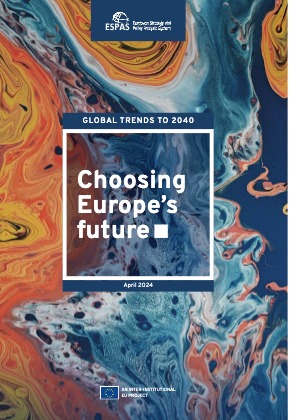Last Edited: 8 months ago
Global Trends to 2040March 2024
Choosing Europe’s Future
This is the fourth ESPAS (European Strategy and Policy Analysis System) global trends report since the establishment of this inter-institutional EU foresight process in the early 2010s. As on previous occasions, it is being published in a year when the European Union embarks on a new five-year institutional cycle. The report analyses the key global trends towards the year 2040 and their possible impact on the Union, and sets out some strategic choices and questions that Europe's leaders may need to address in the coming five years and beyond. The report is the product of a unique collaborative process over the past year involving officials from across the nine ESPAS institutions and bodies.
The report sets the centrality of geopolitics as a transversal trend, given the on-going shift from an era of cooperation to an era of competition as well as the deepening fragmentation of the international system and the acceleration of major global transitions. The Report highlights how the borders between EU internal policy and external policy are blurring nowadays and will probably blur even more in the future. The primacy of geopolitics is outlined across the various trends identified in the report: from the economic challenges to demography, from the environmental and climate crisis to the energy transition, from the quest for equality to the technological acceleration, and including health, democracy and the broader changes on how we live.
The publication concludes by outlining the strategic imperatives for the incoming EU leadership. It calls for a multifaceted approach to establish the EU as a smart global power, ensure a socially equitable green transition, navigate economic risks, update the economic model, innovate within a balanced regulatory framework, and strengthen social cohesion.
Between now and 2040, Europe and the world will undergo profound geopolitical, economic, technological and social change. The generation now growing up will live in a world that we can only imagine. However, integrating long-term goals into short to medium-term decision-making can boost our chances of leaving a world that is in better shape to the next generation. The more we understand the challenges ahead, the better we can anticipate and prepare for the changes to come. There are grounds for optimism. The EU has arguably been able to make progress in the past precisely when the challenges seemed overwhelming. When pressed, it can marshal reserves of determination and ingenuity. The next EU leadership will need to draw deeply on these reserves in the years ahead.
Source: EEAS Global Trends to 2040: Choosing Europe’s Future
Posted on: 30/04/2025

